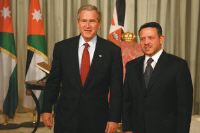 |
| King Abdullah II of Jordan, right, receives President George W. Bush, left, upon his arrival in Amman yesterday. Bush arrived for a two-day visit to meet with Jordan’s King Abdullah II and Iraqi Prime Minister Nouri al-Maliki, but the summit was canceled due to public disclosure of U.S. doubts about his capacity to control sectarian warfare. Photo by Nader Daoud/Associated Press. |
Jerusalem – It can now be confirmed that Israel’s failure to respond to Palestinian missile attacks on Israel’s western Negev region was the result of pressure placed on the Israeli government by the Bush administration. The pressure succeeded only days before Israeli armed forces were to launch an incursion into Gaza, following more than 1200 missile attacks emanating from that area in a little more than 14 months.
An Israeli government official told the Middle East News Line that the White House and State Department demanded that Prime Minister Olmert suspend all operations in, and withdraw from, the Gaza Strip in exchange for a Palestinian Authority agreement to a cease-fire.
The visit by President George W. Bush to Jordan yesterday, where he met with Jordanian leaders, was the primary factor for this pressure.
“Olmert was first told of the cease-fire proposal when he came to Washington earlier this month,” the official said. “Last week, Secretary of State Condoleezza Rice called Olmert and said she expected an end to Israeli military operations.”
U.S. Deputy National Security Adviser Elliott Abrams is expected to meet Abbas in Amman. Officials said Abrams would then issue a recommendation regarding the feasibility of a meeting between Bush and Abbas. They said the U.S. president was not expected to meet Olmert.
The cease-fire, which the PA was to produce in exchange for Israel’s agreement to refrain from taking defensive action, has already failed.
Palestinian gunners have fired Kassam-class, short-range missiles from the northern Gaza Strip into Israel earlier in the week.
“The cease-fire is still very fresh,” State Department spokesman Sean McCormack said on Monday. “We hope that those security forces, as they get in place, would stop any such rocket attacks or any terrorist attacks that might be emanating from Gaza.”
McCormack said the United States would seek to extend the cease-fire to the West Bank. But he said this depended on an effective cease-fire in the Gaza Strip.
The State Department has also pressed Israel to ease restrictions on Palestinian travel and offer to free Palestinian convicts.
The Department expressed satisfaction with Olmert’s speech on Monday that offered Israel’s withdrawal from large portions of Judea and Samaria on the west bank of the Jordan River in exchange for peace with the Palestinians.
Olmert also expressed readiness to release a large number of Palestinian convicts in the context of a real peace agreement.
The official said Rice spoke to leaders in Egypt, Qatar and Saudi Arabia to persuade Hamas to accept the cease-fire as the first step toward a U.S. peace initiative. Apart from Iran, Qatar and Saudi Arabia have been leading financiers of Hamas. Both Egypt and Qatar have invited the Hamas leader, now the Palestinian Authority Prime Minister, Ismail Haniya for a state visit.
Rice has been in nearly daily contact with Israeli leaders to ensure that the military refrains from operations in the Gaza Strip, officials said. On Monday, they said, the U.S. secretary discussed the ceasefire with Israeli Defense Minister Amir Peretz.
“Condi plans to arrange to meet Olmert and Abbas and seeks to reinforce the ceasefire and discuss the next step,” the official said.
©The Bulletin 2006







